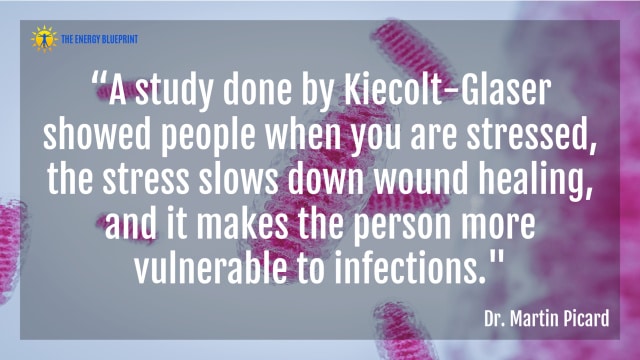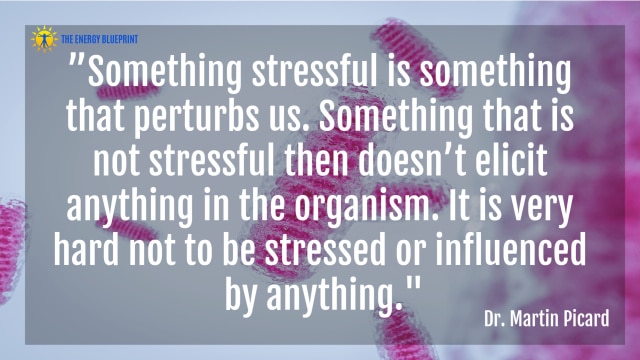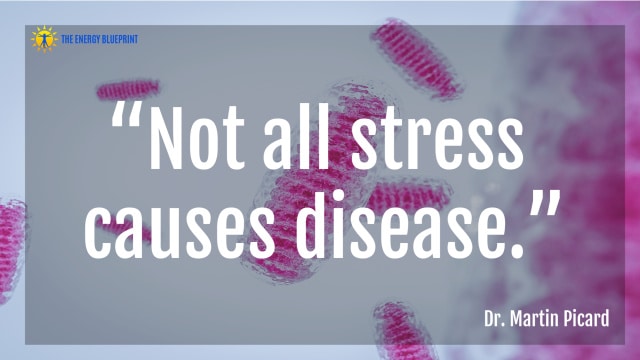 Dr. Picard is an assistant professor of behavioral medicine in Psychiatry and Neurology at Columbia University. He obtained his Ph.D. in mitochondrial biology of aging in 2012. For over a decade, he has been studying mitochondria and has worked closely with leading experts in the field of mitochondrial research. In 2015 he joined the faculty at Columbia University where he established the mitochondrial signaling laboratory.
Dr. Picard is an assistant professor of behavioral medicine in Psychiatry and Neurology at Columbia University. He obtained his Ph.D. in mitochondrial biology of aging in 2012. For over a decade, he has been studying mitochondria and has worked closely with leading experts in the field of mitochondrial research. In 2015 he joined the faculty at Columbia University where he established the mitochondrial signaling laboratory.
This article is derived from a previous podcast with Dr. Picard on The Stress-Mitochondria Link (And Why Your Mitochondrial Health Is The Secret Key To Energy And Longevity.)
How Stress Increases Your Risk Of Disease

Most people, at some point in their lives, go through a period of stress only to come down with an infection afterward. Unsurprisingly, numerous studies show a direct link between stress and the susceptibility to infections. When you are stressed, you are more vulnerable to catching a cold or the flu, and wounds may take longer to heal.
Unfortunately, most of these studies and their findings are not included in medical school curriculums, nor are they a part of the general biomedical framework. Dr. Picard believes that this is mainly due to a general lack of understanding of how the body responds to psychological stress.
On the one hand, you have a stressful experience which feels very real to you, but which happens in your mind. On the other hand, you have an immune response, which makes you more vulnerable to infections.
So, what is the connection? What links the mind to the immune system?
Dr. Picard explains: “Anna Marsland and Brett Kaufman in Pittsburgh did some research that showed that if you expose someone to psychological stress (for example, by asking them to speak in front of a camera) and the person feels stress, a bit angry, and uncomfortable, and if they took blood tests 30 minutes later, there was more mitochondrial DNA released into the bloodstream. So, that demonstrates the mitochondria somehow respond to that subjective experience and then respond by releasing the mitochondrial genome.”
Key Point: Numerous studies show that there is a potentially strong link between stress and a weakened immune system. This link may explain why many people come down with a cold or the flu after living through a stressful period. Researchers may have found the primary cause of the weakened immune response: your mitochondria.
How Chronic “Toxic” Stress Affects Your Body

When we experience a stressor—and it can be something as simple as a single word—it can trigger a whole cascade of reactions in our bodies, such as:
- faster heartbeat
- release of hormones
- increase in blood pressure
- rise in body temperature
Each of these reactions have one thing in common: they require energy. There is nothing in the body that moves or changes that doesn’t expend energy.
Energy is vital to every part of the stress response, so it’s likely one of the first things to change when stress occurs. Likewise, because mitochondria are the primary regulators of energy levels, mitochondria must be first in line to detect and react to a change in energy.
Mitochondria are everywhere, including inside your adrenal glands. One of the most well-known hormones produced inside the adrenal glands is cortisol. Have you ever wondered exactly where in the adrenal glands cortisol is produced? It’s inside the mitochondria, along with stress hormones.
Oddly enough, the body both synthesizes stress hormones and regulates energy output in the same organelle, the mitochondria.
How Acute Hormetic Stress Affects Your Body
Opposite of chronic stress is acute stress. Acute stress—such as exercise and intermittent fasting—is a form of hormesis and is actually quite beneficial for your health. For example, taking the stairs instead of the elevator will stimulate parts of your legs, heart, and brain, and your body will become a little bit stronger. That is hormesis: the body adapting to a small challenge and becoming stronger as a result of it.
Summary
It has long been speculated where the connection between psychological and physical health lies. Science has proven numerous times that stress has a direct influence on your immune system. When you undergo a period of stress, you are more likely to become sick and to heal more slowly than usual. A recent study found an increase in mitochondrial DNA in the blood of people shortly after having been exposed to what they perceived to be a significant stressor. These findings indicate that mitochondria may play a crucial role in the immune response to stress.
And there may be something to it. When you get stressed, your heart starts beating faster, your body temperature increases, and you release stress hormones. All of these reactions require energy that is regulated by the mitochondria. Coincidentally, stress hormones are also produced inside the mitochondria of the adrenal glands. These intricate processes demonstrate just how intertwined energy capacity and stress response are, and the mitochondria are probably at the core of it all.
Finally, there are essentially two types of stress: chronic stress and acute stress (hormesis). Whereas chronic stress damages your mitochondria, acute stress builds and strengthens the mitochondria. The goal is to minimize chronic stress and increase hormetic stress.






